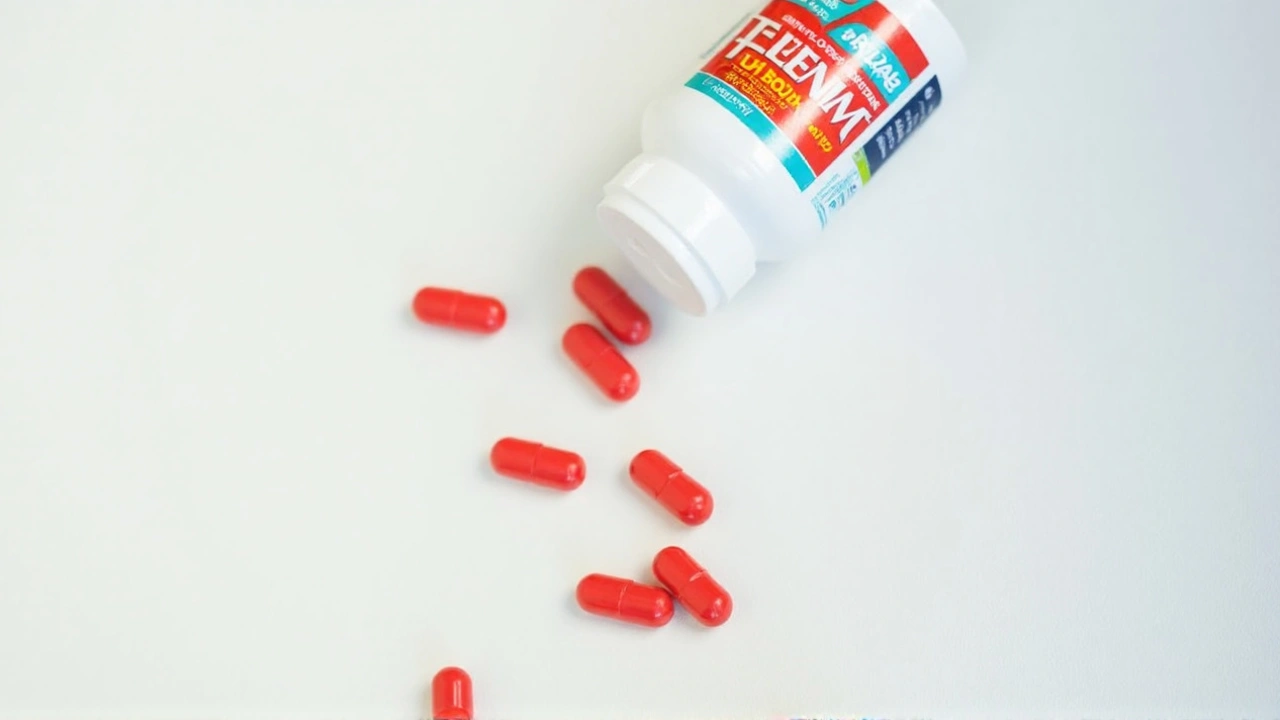Researchers at the Icahn School of Medicine at Mount Sinai have taken a fresh look at a topic that has quietly shaped prenatal care for decades: the safety of prenatal acetaminophen. By applying the Navigation Guide—a gold‑standard method for evaluating environmental health evidence—they sifted through 46 studies, covering more than 100,000 mother‑child pairs across several continents.
Key Findings From the Review
The systematic review uncovered a striking pattern:
- 27 of the 46 studies reported a positive association between acetaminophen exposure in utero and neurodevelopmental disorders such as autism spectrum disorder (ASD) or attention‑deficit/hyperactivity disorder (ADHD).
- 9 studies found no statistically significant link.
- 4 studies suggested a protective effect, though these were generally lower‑quality and smaller in scope.
Crucially, when the team weighted the evidence by study quality—considering factors like bias, reporting transparency, and sample size—higher‑quality investigations were more likely to show the adverse association. This suggests that the signal is not simply an artifact of weaker research designs.

Implications for Pregnant Women and Healthcare Providers
Acetaminophen (known as Tylenol in the U.S. and paracetamol elsewhere) remains the most common over‑the‑counter pain and fever medication taken during pregnancy, with usage rates exceeding 50 % globally. Historically, it has been labeled the safest option, especially when alternatives such as NSAIDs carry known fetal risks.
The new synthesis challenges that long‑standing perception. By demonstrating a consistent association with ASD and ADHD, the review urges clinicians to rethink prescribing habits. The authors recommend limiting acetaminophen to the lowest effective dose for the shortest possible duration, reserving its use for situations where the benefits clearly outweigh the potential neurodevelopmental risks.
Beyond individual prescriptions, the findings could steer policy discussions worldwide. Health agencies may need to update guidelines, incorporate warning labels, or fund further large‑scale, longitudinal studies to clarify dose‑response relationships and identify vulnerable windows of exposure.
For expectant mothers, the takeaway is to engage in open dialogue with healthcare providers about pain management options. Alternative strategies—such as non‑pharmacological approaches, targeted physical therapy, or, when necessary, carefully monitored use of other medications—should be explored before reaching for acetaminophen.
The study also underscores the broader importance of rigorous evidence synthesis in environmental health. By adopting the Navigation Guide methodology, the Mount Sinai team set a new benchmark for how complex, heterogeneous data can be objectively evaluated, giving policymakers and the public a clearer picture of risk.

17 Comments
Jeyaprakash Gopalswamy
September 25 2025
Been taking Tylenol for my back pain during pregnancy and now I'm freaking out. But honestly, I don't know what else to do-ibuprofen is a no-go, and my doctor said acetaminophen is the safest. Maybe we need better alternatives, stat. This study makes sense though; we've been treating pregnancy like it's just a cold you can medicate through.
ajinkya Ingulkar
September 26 2025
This is yet another Western medical conspiracy to scare pregnant women into submission. In India, we've used paracetamol for generations-our kids are fine, sharp, and successful. This study is funded by Big Pharma to push expensive 'natural alternatives' that don't even work. Stop scaring women with weak correlations disguised as science.
nidhi heda
September 27 2025
OMG I took Tylenol like 17 times last trimester 😭 I'm going to have a child with autism and I didn't even know?? I feel like such a terrible mom already. My sister's baby has ADHD and she took it too-IT'S A PATTERN. I can't sleep anymore. Someone hug me.
DINESH BAJAJ
September 28 2025
Of course 27 studies show a link-because correlation is causation now, right? What about the 9 that showed nothing? Or the 4 that said it helped? You cherry-pick the data that fits your narrative and call it 'gold standard.' This isn't science-it's activism dressed in lab coats. Next they'll say breathing causes autism.
Rohit Raina
September 28 2025
Let’s be real-this is the same pattern we saw with thalidomide, DES, and even smoking in pregnancy. We panic, we overreact, then we realize we didn’t have enough data. The real issue isn’t acetaminophen-it’s that we treat pregnancy like a lab experiment without long-term follow-up. Let’s fund proper cohort studies before we make mothers feel guilty for being human.
Prasad Dhumane
September 28 2025
This is the kind of research that gives me hope. Not because it's alarming, but because it's rigorous. The Navigation Guide isn't just a fancy name-it's a framework that forces us to weigh bias, sample size, and transparency. And yeah, the fact that higher-quality studies consistently show risk? That's not noise. That's a signal. We've been treating pregnancy like a minor inconvenience, not a biological miracle. Maybe it's time we stop treating meds like candy and start treating them like… well, medicine.
rajesh gorai
September 29 2025
The ontological epistemology of prenatal pharmacological exposure reveals a hermeneutic rupture in the anthropocentric paradigm of maternal autonomy. The pharmacokinetic interplay between placental transfer and neurodevelopmental plasticity operates within a non-linear, dose-dependent attractor basin-where even subtherapeutic exposure may induce epigenetic modulation via CB1 receptor dysregulation. We're not just talking about Tylenol-we're talking about the collapse of the Cartesian subject in the age of environmental epigenetics.
Rampravesh Singh
October 1 2025
It is with profound responsibility that we must address the implications of this landmark study. The health of future generations depends on the diligence of healthcare professionals and the informed choices of expectant mothers. Let us not be swayed by fear, but guided by evidence, ethics, and unwavering commitment to the sanctity of life. We must act-now-with clarity, precision, and moral courage.
Akul Saini
October 3 2025
Interesting that the protective-effect studies were lower quality. That’s exactly what you’d expect if the signal is real-noisy, underpowered studies tend to drift toward null or even opposite effects by chance. The weighting by methodology here is critical. Also, timing matters-exposure during weeks 8–16 might be the real window. We need more granular data, not just ‘did you take it?’ but ‘when, how often, and why?’
Arvind Singh Chauhan
October 4 2025
I wonder if the real problem isn’t acetaminophen, but the fact that we’ve normalized suffering in pregnancy. Back pain? Take a pill. Headache? Take a pill. Anxiety? Take a pill. We’ve turned motherhood into a medical condition. Maybe the solution isn’t less Tylenol-it’s more support. More rest. More community. More dignity. But that’s harder to sell than a warning label.
AAMITESH BANERJEE
October 5 2025
My wife took Tylenol for a week during her second trimester because of a sinus infection. She didn’t even think about it-her doctor said it was fine. Now I’m reading this and I’m just… stunned. But I also don’t want to blame her. She did what she was told. Maybe the problem isn’t the moms-it’s the system that tells them it’s safe without saying ‘but here’s the fine print.’ We need better communication, not guilt trips.
Akshat Umrao
October 5 2025
My mom took paracetamol all through my pregnancy (I’m 32 now). I’m a software engineer. No ADHD, no ASD. Just… me. I get the science, but I also know that humans aren’t data points. We need to be careful not to turn every pregnancy into a minefield. Maybe the answer is ‘use it sparingly’-not ‘never use it.’
Sonu Kumar
October 7 2025
Of course the Mount Sinai study is ‘rigorous’-it’s funded by the same institutions that pushed the ‘low-fat diet’ dogma for 40 years. The real villain here? The pharmaceutical-industrial complex. They profit from fear. They profit from pills. They profit from mothers who believe they’re powerless. Wake up. This isn’t science. It’s branding.
sunil kumar
October 8 2025
While the statistical associations presented are noteworthy, one must consider confounding variables such as maternal inflammation, underlying conditions requiring analgesia, and genetic predispositions. The study design, though methodologically sound, does not establish causality. Further longitudinal analysis with biomarker correlation is warranted before clinical guidelines are revised.
musa dogan
October 10 2025
Let me tell you something-back in Lagos, women take paracetamol like candy. No doctors, no warnings. We’ve got 12 kids in my block-all brilliant, all loud, all alive. This study? It’s written by people who’ve never held a crying baby at 3 a.m. and thought, ‘I just need one pill to survive.’ Don’t shame us for trying to live.
Mark Dodak
October 12 2025
I’m a dad of a 7-year-old with ADHD. We never found a cause. But reading this… it hits different. My wife took Tylenol for migraines every other week. I never thought twice. Now I wonder. I don’t blame her. I blame the fact that we were never told ‘maybe, just maybe, there’s a risk.’ We need better transparency-not panic. Just… honesty.
Stephanie Reed
October 14 2025
Thank you for sharing this. I’ve been terrified to take anything during pregnancy, but I also had terrible headaches. I wish someone had said, ‘Use it only when necessary, not as a daily habit.’ This isn’t about fear-it’s about awareness. I’m sharing this with my OB-GYN tomorrow.